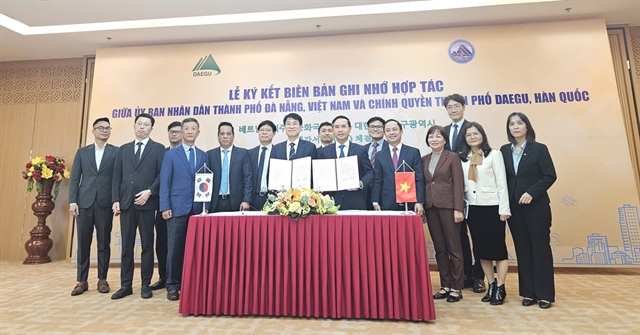 Society
Society


|
| Nguyễn Đình Đức, professor and science doctor from Việt Nam National University. — Photo dantri.com.vn |
Nguyễn Đình Đức, a professor from Việt Nam National University, speaks with the online newspaper giaoduc.net.vn about the implementation of the Vietnamese Qualifications Framework and the difficulties training institutes will face when applying the new framework
How will the Vietnamese Qualifications Framework help solve problems in higher education?
First of all, we need to say that Việt Nam's National Qualifications Framework is necessary.
On October 18, 2016, the Government approved the Vietnamese Qualifications Framework with eight levels from Elementary to PhD. It was designed to lay a foundation for higher education institutions to prepare appropriate training programmes and help Vietnamese labourers get more opportunities to seek jobs.
There are five targets of the National Qualifications Framework.
Firstly, it helps to classify and standardise learning capacity as well as diplomas and certificates suitable to vocational education and higher education in Việt Nam.
Secondly, it establishes an effective connection mechanism between the requirements of employers and the system of training qualifications.
Thirdly, it acts as a basis for educational institution planning and training programme output standards for professions at all levels. It develops policies to improve the effectiveness of human resources training.
In addition, it establishes relationships between the national qualification frameworks of regional countries and those of the world as a basis for mutual recognition of qualifications among countries.
Finally, it creates a mechanism for connecting levels of training and building lifelong learning habits.
With these goals, I think if the Vietnamese Qualifications Framework is implemented methodically, seriously and in the right direction, it will contribute to overcoming shortcomings of higher education training and improving the integration of Vietnamese higher education in the region and the world.
Some experts are concerned that the implementation of the new framework will bring few positive impacts compared to the previous programme and might cause difficulties for schools in their autonomy. What do you think?
The quality of training depends on many factors, such as learning facilities, quality of teachers and learners, the training programmes, training management and output standards.
The implementation of the new framework is vital for its success. With the trend of increasing autonomy of universities and the strong impact of Industry 4.0, training programmes are becoming more interdisciplinary and erasing boundaries between industries in the same field.
The organisation and management of training activities are becoming more and more individualised, so it is recommended to set basic and minimum output standards.
It is advisable for educational institutions to be flexible in developing training programmes appropriate to their capabilities and strengths, as long as they can meet output standards stipulated in the Vietnamese Qualifications Framework.
Also, the number of undergraduate training programmes is very large and constantly changing. With my experience, I believe it would be feasible to develop and issue standard programmes for certain industries or sectors.
The standards of training programmes can be prioritised in information technology, medicine, law, engineering etc. and industries where workers are allowed to move around within ASEAN countries.
It is possible to set the most common output standards for a number of industries such as philosophy and anthropology like other countries apply.
Each training institution will have its own characteristics and identities. Therefore, it is not easy to develop a standard programme to implement at different training institutions.
The Vietnamese Qualifications Framework will issue standards for training programmes based on output standards. How will such regulations affect higher education institutes?
This is an advanced and scientific approach in developing training programmes. A school announces its outcome standards based on its training programmes, which must have content or modules to help learners achieve such output standards.
The promulgation of standards of training programmes according to output standards will create a framework for certain industries and help to eliminate the chaos of training programme development.
It will improve the quality of Việt Nam's human resources, help training institutes save time and money in developing training programmes, and be an effective tool for State management agencies to control the quality of training products.
What measures are needed to ensure the success of output standards?
The most important factor in all success is human.
Representatives of those involved such as the State, schools, experts, employers, teachers and lecturers, and learners should participate in the development of the programme's output standards.
We also need a complete and scientific implementation process. In the construction process, it is necessary to refer to the output standards of corresponding training programmes in the world and pay special attention to the opinions of those involved.
The output standards will be unrealistic if they are built based on the ideas of only some people.
The output standards must be associated with researching, learning with practice and the requirements of employers in Việt Nam and abroad.
They must forecast the requirements of future human resources as well. They need to be updated regularly to avoid being out of date compared with the development of science and technology and labour market requirements. — VNS